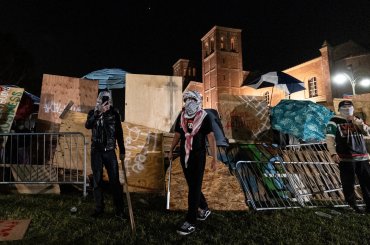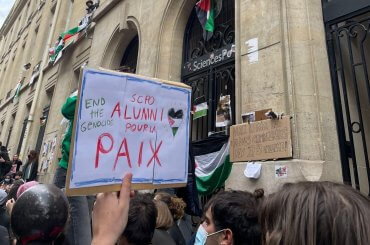
California officials participate in a panel on Israel-California trade at the Jewish Public Affairs Committee’s advocacy day. (Image via Jewish Federations of LA)
Over 30 California state legislators have signed on to a letter criticizing the boycott, divestment and sanctions (BDS) movement and the passage of divestment resolutions on California college campuses. Addressed to the chair of the University of California (UC) Regents, which controls UC investments, the letter “congratulates” the Regents on “standing firm” against divestment.
The letter (published in full below) adds that the BDS movement is “divisive,” contributes to an “antagonistic environment for students who support Israel,” and will drive prospects for peace in Israel/Palestine further away. It applauds the UC Regents for their 2010 statement that they would only divest from a country the U.S. government deemed was committing genocide.
Senator Darrell Steinberg, the leader of the California Senate, worked with the Jewish Public Affairs Committee of California (JPAC) and Assemblyman Bob Blumenfield on the letter. Steinberg, known as a powerful liberal in California, is a staunch supporter of Israel and a former chairman of Sacramento’s Jewish Community Relations Council (JCRC).
Mondoweiss obtained the letter from California-based activists, who in turn received it from staff at California legislators’ offices. Calls and e-mails to Steinberg’s and Blumenfield’s office went unreturned by the time of publication.
The missive is a reaction to the drive for divestment on California campuses that garnered some modest success over the past academic year. “Due to the number of BDS resolutions that have been brought forward on UC campuses this year, we felt it was very timely,” a JPAC spokesperson said.
Over the past academic year, student government bodies at the UC campuses of Irvine, San Diego and Berkeley passed resolutions urging the UC system to divest from corporations profiting from the Israeli occupation.
UC officials have reiterated time and time again that they will not divest from Israel based on student government recommendations, making the resolutions symbolic. Still, the divestment drive has captured the attention of state officials, and, in the case of San Diego, the attention of members of the House of Representatives.
Members of Palestine solidarity student groups in California criticized the legislators’ letter when contacted. “The letter represents an attempt to police political speech on campus that simply disregards the voices of a growing number of UC students and faculty,” wrote Rebecca Pierce, a member of UC Santa Cruz’s Committee for Justice in Palestine, in an e-mail to me. “The divestment bills students presented throughout California this year were endorsed by a broad coalition of campus organizations representing a wide range of communities.”
The student-authored resolutions pushed for divestment from a number of Israeli military-linked companies UC has investments in, like Caterpillar, Northrop Grumman, Hewlett-Packard and more.
“It’s just totally inappropriate for the legislature to tell the UC regents…to take sides on something that’s a debate on a public issue on campus,” said David Mandel, a California-based attorney active in the movement for peace in Israel/Palestine. “This is in the context of huge attacks that have been going on…targeting advocates of Palestinian rights, particularly Arabs and Muslims, but also other supporters including Jews…It’s just another example of trying to quell this speech expressing a particular opinion.”
The letter was a priority for the Jewish Public Affairs Committee of California , and was also backed by the Anti-Defamation League, a member of JPAC. JPAC includes a number of other Jewish organizations as well, including local Jewish Federations and Jewish Community Relations Councils.
In May 2013, JPAC, whose board chair Dave Rand is a former Political Director for the American Israel Public Affairs Committee, held an advocacy day in Sacramento.
JPAC advocates “mingle[d]” and “schmooze[d]” with California legislators during the advocacy day. “[W]ith a strong and united voice, advocates met with over 50 senators and assembly members at the capitol and advocated on three issues,” a JPAC press release states. “The third [issue] was not a bill, but asks that law makers sign onto a letter to the UC Regents thanking them for their stance against divestment from companies that do business with Israel.” JPAC said they have “a rate of 100% support from legislators on our policy priorities for this year.”
JPAC’s claimed success isn’t stopping California-based advocacy groups on the left from mobilizing against the letter, though. A coalition of groups including National Lawyers Guild chapters in California, the Center for Constitutional Rights and Jewish Voice for Peace have authored a letter criticizing the legislators’ effort that will be delivered to California officials this week.
The coalition writes that the legislators’ letter could leave students “bullied and intimidated” and chill free speech. A JPAC spokesperson would only say they “disagree” with those criticisms.
The coalition also criticizes a factual error contained in the legislators’ letter. While the legislators’ letter says that the divestment resolutions targeted Israel itself, the coalition notes that the resolutions were about “specific (mostly if not all U.S.-based) corporations that profit from and support concrete Israeli government violations of international law, human rights and equality. We can think of no other explanation for this misstatement except that the letter’s authors sought to obfuscate the nature of the resolutions in order to gain support for their goals.”
The back and forth between legislators and advocates for Palestinian rights is just the latest chapter in the battle over BDS in California. Last year, the California legislature passed a resolution known as HR 35, which denounced alleged anti-Semitism on California campuses and condemned the BDS movement. HR 35 was drafted with the help of the Simon Wiesenthal Center. Earlier this year, the JCRC held an invitation-only conference in Burlingame, California aimed at combatting divestment initiatives in churches.
The JCRC’s Bay Area executive director, Rabbi Doug Kahn, also attended the JPAC advocacy day, where Jewish groups asked legislators to sign on to the anti-BDS letter.
Here’s the letter in full:
CA Legislators’ Anti-BDS Letter
Here’s the list of California legislators who have signed on so far:
Senators
Steinberg
Anderson
Leno
De León
Huff
Lieu
Emmerson
Wolk
Gaines
DeSaulnier
Torres
Roth
Evans
Jackson
Block
Galgiani
Assemblymembers
Blumenfield
Bloom
Dickenson
Hall
Conway
Das Williams
Levine
Buchanan
Bonilla
Calderon
Chau
Rendon
Patterson
Fox
Olsen
Stone
Daly
V. Manuel Perez
Ting
Fox



Anyone know where I can find a printed, rather than hand-written, list of the signers? I’ve tried a bunch of the links in this post but haven’t found it. Many of us in California would like to know which of our legislators signed this latest piece of BS, but the handwritten signatures on the Scribd version are hard to make out.
While israeli businessmen tell Netanyahu the current policy is very bad for the Israeli economy. BDS is winning.
These blowhards are powerless. Students will speak up for resolutions to boycott Apartheid Israel to the maximum extent allowed by law. The blowhards will just have to live with that.
There are many ways to say “Boycott Israel”:
http://dearbornboycottsisrael.blogspot.com/
Here’s hoping that early September sees many students demanding boycott-Israel resolutions as a matter of basic human rights.
The institutional bias will continue, but they’re losing the campus in record time. Now even the Berkeley student body has gone against them.
Didn’t they divest from South Africa?
SA was bad, but not genodical.
In any event, I do NOT support BDS.
But that official 2010 explanation made no sense at all.